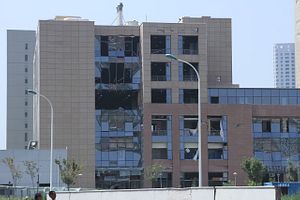While Chinese President Xi Jinping is touring factories and visiting schools in Seattle, Premier Li Keqiang is staying busy back in China. On Tuesday, Li had a particularly important task: hearing a briefing on the State Council’s investigation into the deadly explosions that took place in Tianjin last month.
On August 12, two major explosions occurred at a chemical warehouse in Tianjin, killing 165 people. China’s state media later reported that the company that operated the warehouse, Tianjin Ruihai International Logistics Co. Ltd., had used the political connections of its owners to circumvent safety regulations and inspections. In the wake of the explosion, China announced that 23 people — business executives, including officials at Tianjin’s port, as well as government officials — had been arrested for their roles in the blasts. Beijing also announced that Yang Dongliang, head of China’s State Administration of Work Safety was being investigated for corruption, although that move was not directly tied to the Tianjin blasts.
The State Council investigation team was called to examine the extent of the damage as well as the cause of the blast. According to Xinhua, Li was briefed on both those points – but the story did not actually include the investigation’s findings, as the report has not yet been finalized.
As for the question of damages, the numbers are unclear. Estimates of the damage done by the blast are staggering – Credit Suisse put the number of insurance losses $1-1.5 billion; a more recent estimate from reinsurance firm Guy Carpenter said insurance losses could reach as high as $3 billion. The State Council’s estimates will have to wait until the investigation’s report is completed and made public.
Meanwhile, Xinhua announced on Monday that “investors and real estate developers” have established a fund worth 5 billion renminbi ($780 million) to repair or rebuilt the roughly 10,000 apartments affected by the blast. But real estate developers – the same ones running the compensation fund — also interested in buying up the damaged apartments from their original owners, the potential for a conflict of interest is clear.
As for the question of responsibility, the preliminary report pointed to “irregularities and illegal operations by the companies involved, and acts of corruption and dereliction of duty on the part of relevant departments.” Li vowed that those found ultimately responsible “shall be held accountable and punished in accordance with law and discipline.” Punishments could range from intra-party discipline (including being dismissed from office) up to criminal action. Li also urged other local governments to learn from the tragedy: “the red line of workplace safety will not be crossed.”
The Chinese public followed the Tianjin blasts and the aftermath attentively – from mourning the firemen killed at the scene to calling into question how the tragedy was allowed to happen in the first place. The local government’s handling of the tragedy, from releasing information to compensating those affected, has also come under fire. Residents in the destroyed apartment buildings have already complained on inadequate compensation for their lost homes and belongings. Foreign Policy recently published a translation of a popular blog article published by Chinese news outlet NetEase telling the stories of three different residents who tried – and failed – to recoup their losses from the local government.
Given this context, Li and the central government know exactly how important it is for the State Council’s report to satisfy the public. Li himself told the investigators that the document must be ironclad: “Every detail must be clarified, and a solid chain of evidence must be established without any area of ambiguity.”
He also promised that the report would be publicly released. “Both investigation findings and penalties shall be made public to give a responsible explanation to the martyrs, families of the victims and the general public,” Xinhua paraphrased Li as saying.
































